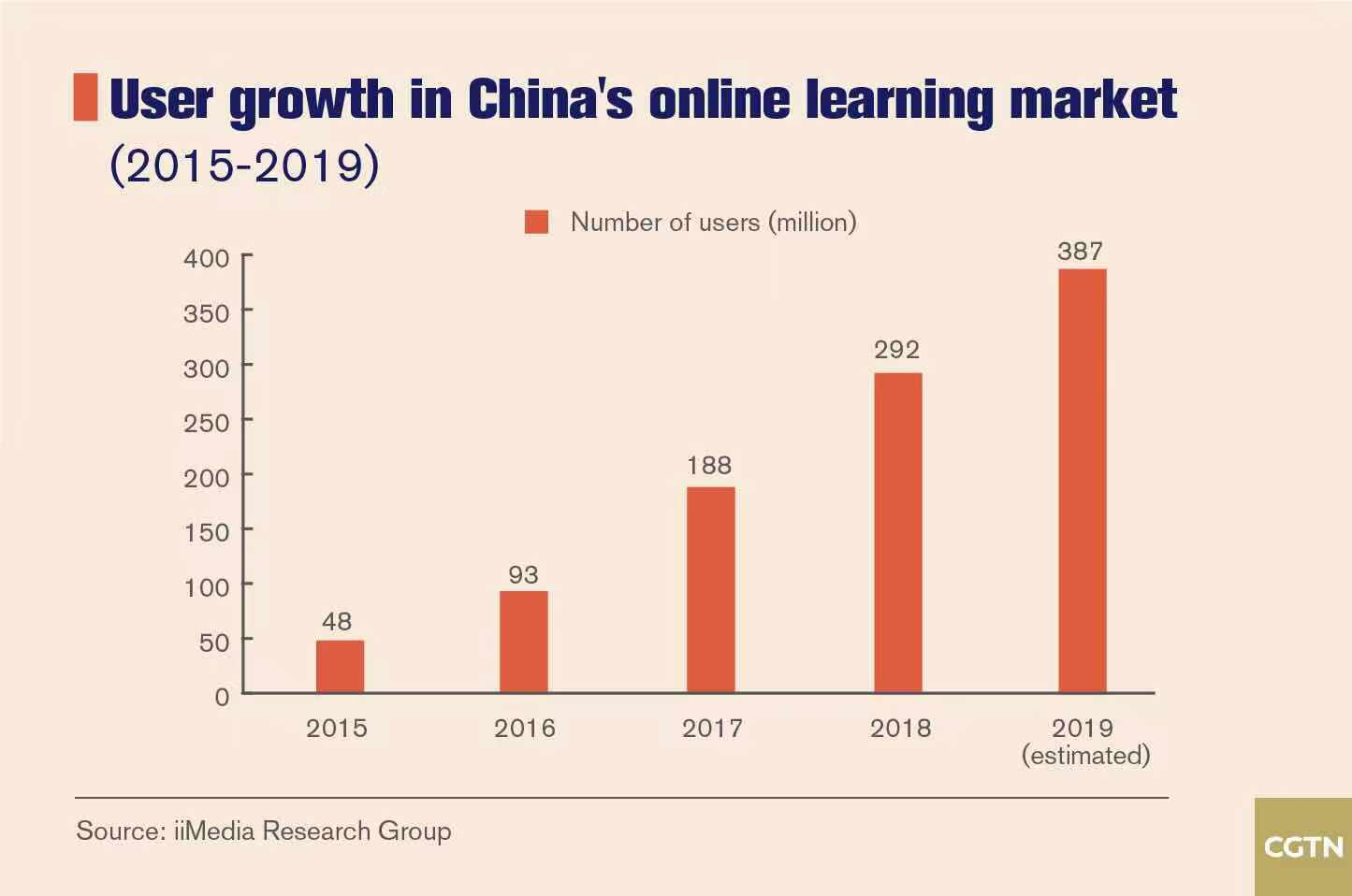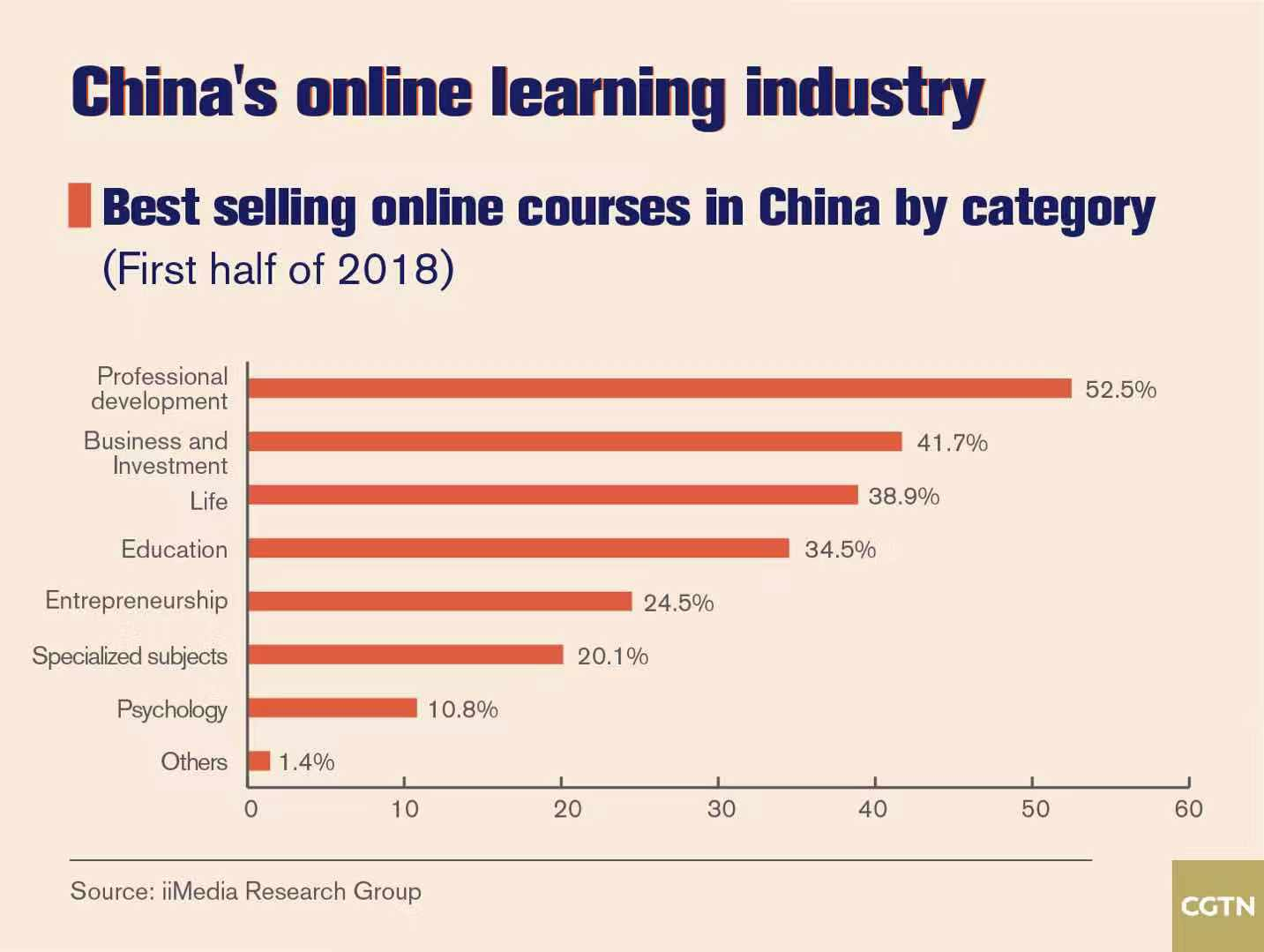Peking University student Yang Qizui, 23, is glued to her phone, which is loaded with learning apps. With a simple click, tap and swipe, the apps give her access to thousands of courses ranging from "How to run a successful WeChat business" to "Understanding Immanuel Kant." The key to all these is a subscription fee.
China's Internet-savvy, digitally-minded millennials are fueling the country's explosive pay-for-knowledge industry where companies package education as a digital product and monetize it via subscriptions or a one-off payment. According to market consultancy firm iiMedia Research, 292 million people had the experience of paying for digital content in 2018.

The founder of audio program Logical Thinking, Luo Zhenyu, delivers his annual New Year speech on trends of the year, a tradition he pledges to keep for the next 20 years. /VCG Photo
The founder of audio program Logical Thinking, Luo Zhenyu, delivers his annual New Year speech on trends of the year, a tradition he pledges to keep for the next 20 years. /VCG Photo
China's explosive pay-for-knowledge industry
Launched in 2012, audio program Logical Thinking is regarded as the frontrunner of China's pay-for-knowledge industry. The host, former television producer Luo Zhenyu, repackages complex historical and philosophical topics into a daily 60-second voice message and a weekly one-hour video lecture. His subjects shifts from the vicissitudes of a civil servant in the Qing Dynasty to the political ambition of Abraham Lincoln, with moral lessons and present-day relevance endowed in historical anecdotes.
One year after its launch, after what is called "the most irrational membership recruitment campaign," the site charged 500 people a membership fee as high as 1,200 yuan and 5,000 people for 200 yuan. Logical Thinking garnered 1.6 million yuan in five hours.
China is home today to around 100 online learning platforms, each trying to come up with innovative ways to offer knowledge with an affordable price tag. Among various forms of packaged knowledge products, online and offline one-on-one consulting services are the most expensive, averaging a few hundred yuan for one hour. Other less customized forms, such as ones with a guest delivering content to a broad audience group, either through a podcast, interactive Q&A or live-streaming lecture sessions, are mostly priced below 199 yuan.

A chart illustrating user growth in China's online learning market. /CGTN Photo
A chart illustrating user growth in China's online learning market. /CGTN Photo
The explosive growth in China's pay-for-knowledge industry has been spurred by the increase in people's purchasing power. When Yang Qizui first got to know Zhihu Live, a live-streaming Q&A session designed by the Quora-like Chinese platform Zhihu, she was genuinely surprised, "most Zhihu Live courses are priced at either 9.9 yuan or 19.99 yuan, which is not pricey at all. And at this low price, I can have access to such diverse fields of knowledge."
Like Yang, most people who had the experience of paying for knowledge are millennial born in the 1980s and 1990s. Zhihu Vice President Zhang Rongle told CGTN Digital, the platform's core user base for subscription-based content are people between the age of 18 to 45 from first-, second- and third-tier cities. Zhang described the group as "having a genuine curiosity to explore the world, but are perplexed by identity shifts from school to the job market and rapid changes in society."
In China, the audio subscription market is the most prosperous. Users can access ad-free audio courses by paying a subscription fee.
"The prosperity of audio courses stems from people's desire to save time - you can multitask when listening to the podcast," iiMedia researcher Li Songlin told CGTN Digital, "the miraculous transformation the country is going through gives rise to a sense of anxiety. Being left behind is inevitable once one stops learning."

The chart illustrates the best selling online courses in China by category. /CGTN Photo
The chart illustrates the best selling online courses in China by category. /CGTN Photo
An industry for all
29-year-old Sophie is a French teacher who had spent a few thousand yuan on online courses before starting her own. After listening to several episodes of a subscription-based podcast called "Reading one book a day with experts," she felt that she would be a better speaker than the invited experts.
"I reached out to the management team of the program and volunteered to record a few sample episodes. Later I was invited to join the program as a speaker."
The program features experts from different walks of life offering their key takeaways of classic literature, one book at a time, all in 30 minutes. Before recording the podcast, Sophie needs to write down the entire script, hand it to an editor at the program, revise it based on the feedback - most of the time to make the script more colloquial to fit the audio-based platform - and hand it in again. This process, from picking up which book to talk about to finish recording the podcast, can last for months.

The Chinese Q&A platform Zhihu holds a nationwide exhibition in Beijing called “Zhihu clinics,” inviting experts to answer users' questions in person, November 10, 2017. /VCG Photo
The Chinese Q&A platform Zhihu holds a nationwide exhibition in Beijing called “Zhihu clinics,” inviting experts to answer users' questions in person, November 10, 2017. /VCG Photo
The boom in China's pay-for-knowledge market presents new opportunities for young people to capitalize on their field of expertise. Xiaoe-tech, a platform that assists content providers in monetizing digital content, reports that 3.5 million knowledge-based products went online with the assistance of the platform in the past two years.
On the other hand, platforms have been actively reaching out to users to share their knowledge, offering them financial rewards or greater influence on the platform. On Zhihu, potential key opinion leaders are invited to join the “content creator center” where a post's number of likes and level of engagement can be analyzed and visibility on the platform increased. According to Zhihu Vice President Zhang Rongle, more than 5,000 users have produced subscription-based content on the platform, and more than six million users have paid.

China's largest online audio streaming platform Ximalaya hosts the country's first 3D audiobook library, August 17, 2016. /VCG Photo
China's largest online audio streaming platform Ximalaya hosts the country's first 3D audiobook library, August 17, 2016. /VCG Photo
A consumer environment conducive to sharing knowledge
The pay-for-knowledge industry is not a phenomenon unique to China, but the reason why it became a multi-million dollar industry has a lot to do with the rapid development of mobile payments in the country and the increased protection of intellectual property, argues iiMedia researcher Li Songlin.
A built-in payment platform is installed in all major pay-for-knowledge platforms. With a click on the phone, all payments are routed through Alipay or WeChat pay - the two dominant forms of mobile payment in China - all within seconds. In 2017, according to data from the People's Bank of China, mobile payments in China totaled 202.93 trillion yuan.

A young woman listens to an audiobook during a book festival held in Beijing, January 12, 2017. /VCG Photo
A young woman listens to an audiobook during a book festival held in Beijing, January 12, 2017. /VCG Photo
In a country that used to be plagued by rampant piracy, the thriving pay-for-knowledge industry has much to thank the government for regarding efforts to protect intellectual property. Luo Zhenyu, the founder of Logical Thinking, said at a press conference that only a small department in his company is responsible for intellectual property protection these days. And even if a violation occurs, it usually takes less than a day to deal with it.
A Shenzhen-based lawyer focused on intellectual property law, who prefers to stay anonymous, said that a surge in awareness of protecting intellectual property has been seen in recent years as evinced by the fact that an increased number of copyright lawsuits were filed. The penalties set by the court has steadily increased too, which has deterred online copyright infringements.
"People's strong demand for learning, coupled with a better commercial environment have contributed to the explosion in the industry," the lawyer said. But there is another simple factor that cannot be ignored, she quipped, "since the content is embedded in the apps, it would be impossible to copy and paste to other platforms. The business model saves it all."








